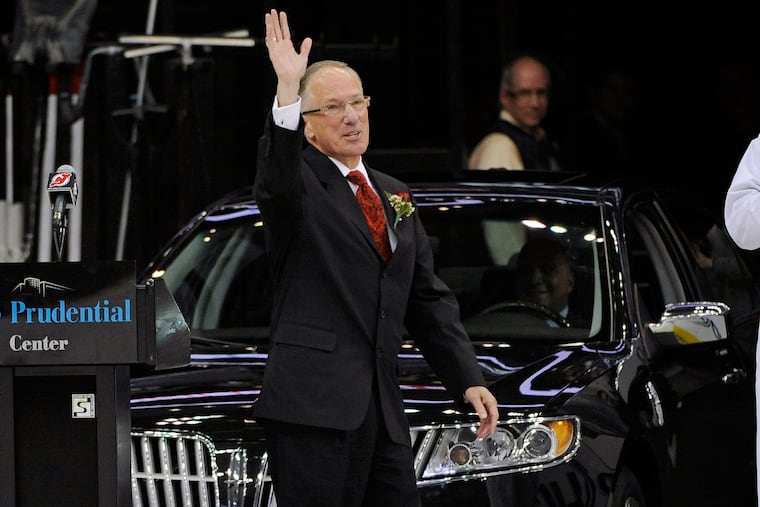Introducing Flyers’ new PRISM broadcaster Mike Emrick | Inquirer archives
Mike Emrick, then a new Flyers announcer, shared how he got into the business and some advice he received from Gene Hart.

This story first appeared in the Philadelphia Daily News on Sept. 11, 1981.
MONTREAL — Mike Emrick’s doctorate, bestowed upon him by Bowling Green University, was really better earned on the Hard Knocks Campus of the Columbia School of Broadcasting.
Mr. and Mrs. Emrick of LaFontaine, Ind., provided him the the right name for an announcer, “Mike,” and a strong, clear voice. The rest he has done on his own. He has no uncles working for any network, yet from the time a 17-year-old Emrick, at the rate of $1.25 an hour, read his first newscast and hosted “Sundown Serendade” on a daylight station in Peru, Ind., his dream has been unwavering.
“From the time I was 5, listening to Bob Elson doing Chicago White Sox games, I knew I wanted to be a sports broadcaster,” said PRISM’s hockey play-by-play man. "It was only when my parents took me to a Fort Wayne Komets hockey game, when I was 12 that I knew it would have to be in hockey.
» READ MORE: Legendary hockey play-by-play man ‘Doc’ Emrick is retiring
"I kept after my education only because there were no openings to do play-by-play. Even after my doctorate, I took a job teaching radio and TV at Geneva College in Beaver Falls, Pa., I went to the local paper there and told them I would cover the Pittsburgh Penguins for free, if they would get me a press pass.
"My only practical play-by-play hockey experience, by that time, was some Bowling Green games on the college station. Finally, after being at Geneva for two years, one of my letters was answered.
“The station that did the Port Huron ( Mich. ) Wings games asked for a tape and I was hired.”
Emrick practiced play-by-play as well as sleeping upright on buses for four years with the Wings, before the team’s coach, Bob McCammon, told him he heard the Philadelphia Flyers were going to start an American League team in Portland, Maine.
“I think it was before Bob had any idea he would wind up as its coach,” said Emrick. “Bob claims it was a coincidence, we were both hired. I’m not sure. Anyway, I kept calling and calling, sent a tape and Gil Stein, then the Mariners' president ( and now vice president of the NHL ) hired me.”
The job in Portland entailed broadcasting and Mariners public relations. With PRISM burgeoning and the Flyers needing help in the other area as well, three years ago Flyers President Bob Butera tried to talk Emrick into coming to Philadelphia.
“The first time, I didn’t want to do it,” said Dr. Emrick. "I wanted to be a hockey broadcaster and doing an entire season in Portland still seemed like better practice than 30 or so games on PRISM. And I thought, with the other parts of the job they were offering, I would be spreading myself thin.
"Then ( Flyers' owner ) Ed Snider talked to me. He said I was limiting my growth in these other fields. I thought about it for about five minutes and he was right.
“Of course I didn’t realize the opportunity I would have to learn television production. Or that PRISM would be as big as it has become.”
When neither the three commercial networks nor sports cable oufits like ESPN showed much interest in providing the U.S. coverage of the Canada Cup, PRISM rode to the rescue (PRISM will carry the U.S.-Canada game tonight at 8 o’clock).
Sunday night’s final has been picked up by 10 cities, providing Emrick with his first national exposure. LaFontaine, Ind., is not one of them, but Mike, 35, is even bigger there than the grain elevator. And deservedly so. His seven years of minor- league practice have produced a hybrid play- by-play style. He is as clear and complete as any hockey play-by-play man on the continent, even if his unassuming, small-town self, will not yet admit it.
“I tend to be more of a background type,” Mike said. "Egotism does not become me. I’m still learning. You pick out what you think are the best traits of the people you think are the best. Until I got to Maine, I had never had anyone critique me.
"Then one day, doing a Maine-Firebirds game at the Civic Center, Gene Hart, who was at the game, picked up the spare headset and did color. Afterwards, he had some suggestions. Some, as I look back on it, were obvious. But when you’re self-taught, they don’t occur to you.
"I’d have the center throw the puck in the corner to get a line change and not give the change. Blake Dunlop would throw it in and next thing you know Paul Evans would come up with the puck. To fans listening closely, they wonder what happened to Dunlop.
"There are a lot of good announcers to pick up things from. Some aren’t as hung up on giving every player who touched the puck, but are exciting and dramatic. Like Dan Kelly ( of St. Louis ) and Lloyd Petit, when he did the Blackhawk games.
"They guys who say more are going to make more mistakes. Gene, doing a simulcast for both radio and TV, always says his chances for errors are greater because of it.
"I think the fans who are really knowledgeable want to know if the puck is in the right or left corner. If you don’t tell him, he feels left out.
“On the other hand, you don’t want to get in the way of the viewer or listener’s enjoyment of the game. On TV, your job is to supplement it. The other thing is being honest. That’s part of living, as well as broadcasting.”